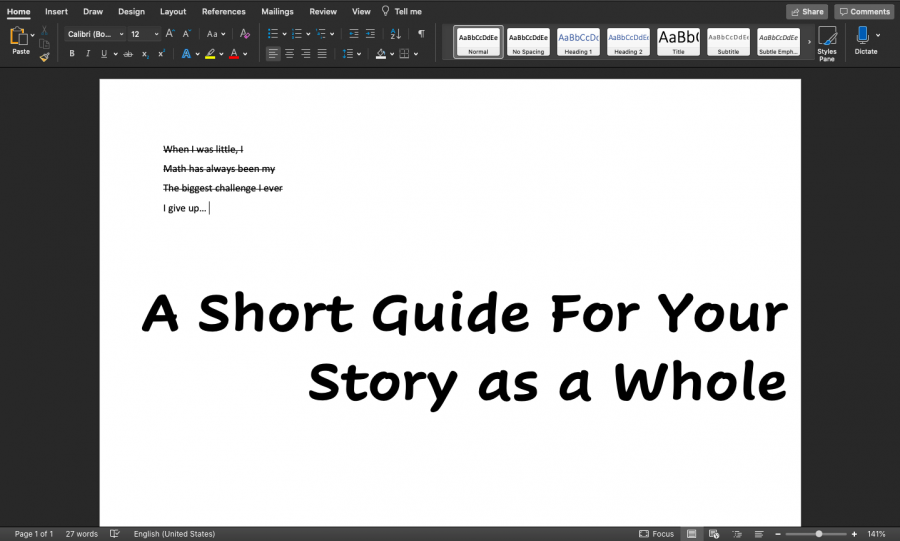The Bigger Picture
Finally, we get to the "Do's"! These are some broad tips to keep in mind, like the foundation being laid down before we start building a house.
September 16, 2020
A Short Guide for Your Story as a Whole
(Source: College Essay Guy, Nationally Recognized College Essay Expert, author)
Now that we know what not to do, let’s get to what we should! I’d like to lay out some basic tips before getting into anything else.
1. Don’t spend too much time obsessing over which prompt to use
(Disclaimer: I’m applying through Common App, where there are multiple prompts to choose from for the personal statement. I’m unsure what other application websites are out there, and the differences they have in regards to the prompt(s). If this doesn’t apply to you, don’t worry about it!)
Admissions officers aren’t concerned at all about which prompt you choose. What they want to know is: 1. Can you write, as well as 2. What will you add to their school?
2. Don’t worry too much about what “they” want
Of course you want to present yourself in a positive light to the people reading your essay, but don’t base it off of what you think they want to hear. This should come straight from you, and be as genuine as possible.
As College Essay Guy says, it’s like getting dressed in the morning and thinking, “Should I wear a red shirt because I like red, or should I wear a blue shirt because statistics show more people like blue?” (we don’t actually know this lol). This is problematic, don’t do that to yourself.
3. Consider being vulnerable
By the end of your essay, the readers should feel closer to you, like they know significantly more about you as a person. Some of the best essays have this quality in them. There are multiple ways to be vulnerable, so don’t feel like you have to tell them about your darkest moments in life in order to have a great essay!
a) Reveal something about yourself you might be judged for, like a mistake you made in the past (it should have a positive outcome, don’t be negative)
b) Reveal something about yourself that’s in conflict with another part of you. Maybe your life has always revolved around playing it safe, and that’s what you’re comfortable with. However, what people don’t know is that you have a secret love for riding motorcycles, and the spontaneity and adventure that comes with it. You get the gist, right?
c) Geek out on something you love! I love art, and a lot of the time I’ll see the world through a painter’s eye. My music playlists are organized by colors, I always tie emotions to colors, honestly I just believe everything in life can be tied back to colors. I could go on and on about it forever, don’t get me started.
4. Examples and Insights (an extension of #3)
Always give examples—imagery that attests to your personal qualities. In addition, you should provide insight into the importance of your example, aka a “so what” moment.
For example, you love to up-style shoes. So what? Because it takes a rather generic product, and turns it into something made just for you. Oh wow, now I know that you pay attention to detail and aesthetic is important to you.
Examples show writing ability, and insight shows critical thinking. Wonderful things to present to your admissions officers!
5. Use all 5 senses to engage the reader’s imagination
This is not to cancel out what I said earlier about providing too much detail. Remember this tip when you’re bringing up important aspects of your story. If I wrote my essay on my love for poetry and decided to share the memory of writing my first, I’d place the readers in the environment with me. Before talking about how it made me feel and how I’ve grown as a writer since then, I’d introduce it in a way similar to this:
“I remember writing my favorite poem like it was yesterday. I sat at my desk wrapped in a fuzzy blanket, a large mug of green tea in my hand. The rain danced against the window as my notebook’s creamy pages stared at me.”
The detail in this recollection shows how important this particular poem is to me, and engages all five senses. The reader can see the creamy pages, hear the rain, smell and taste the tea, feel the blanket. Everything works together.
6. The ending of your essay should feel slightly unexpected, yet inevitable
I know this sounds contradictory, but let me explain. Don’t introduce your ending at the beginning of your essay like a thesis statement. We should slowly get to the conclusion, in a way that we can kind of see where you’re getting at, yet we haven’t gotten a clear answer yet.
Remember when I used the Herbalism example in the first chapter? “When you were living in Siberia you befriended a Shaman, and she inspired you to learn how to use herbs for different purposes. Now you sell natural medicines as a side hustle.” The reader will probably be able to sort of understand where you’re headed, but there’s nothing to confirm it just yet.
This is the type of journey you should take, don’t let the reader know you want to be an Herbalist by the third sentence. Make them work for it!
